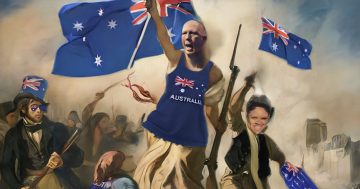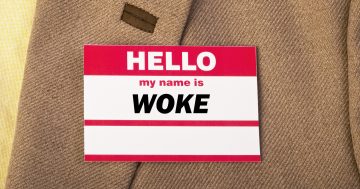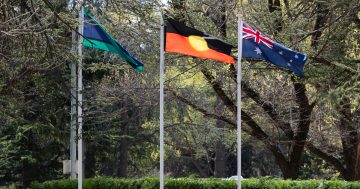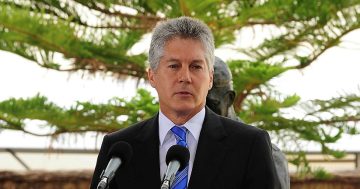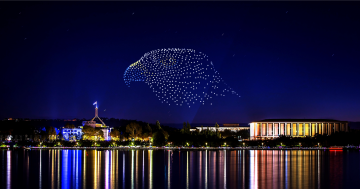
Despite Woolies and Aldi deciding not to stock up for January 26, bargain stores will make sure there are enough flagcapes for all (if that’s your thing). Photo: Chris Roe.
I paused (and sighed) before putting pen to paper – or fingers to keyboard – on this article. It seems like everyone is angry about Australia Day this year.
Which is odd when you consider they’re all fighting about the same thing – inclusion and unity.
Australia Day has been a public holiday since 1988 and marked everywhere on the same day only since 1994. While there’s a long history of doing something or other around January 26, until a few decades ago, the day passed without much fuss.
We’re not arguing about the significance of Christmas or Easter here. This is not Cathy Freeman taking gold at the Olympics, or the Bodyline Series, or winning the America’s Cup.
Australia Day doesn’t come close to evoking the profound, sometimes deeply complex feelings we have about Anzac Day and our war dead. And, importantly, it’s not the Fourth of July either.
That’s a comparison worth making: in the United States, 4 July commemorates the Declaration of Independence, which was ratified in 1776 during a long and bruising war for self-determination fought over eight years. People flocked to America in great waves of migration for hundreds of years, seeking freedom from oppression and injustice.
While similar immigration has happened in this country in more recent decades, an awful lot of us are still descended from people who didn’t have much say about their arrival.
This is a different country, with different attitudes and different ways of showing our loyalty.
As Australians, we should be deeply proud of what we’ve created from an initially unpromising penal settlement, peopled by soldiers clashing with unruly, resentful convicts and angry traditional owners.
The peaceful, rich, diverse nation we’ve built – with the world’s 13th-largest economy – is a marvel.
Our parliamentary democracy is probably the most effective in the world. We are a moderate people, pragmatic, skilled and valued wherever we go for our steadiness, common sense and commitment to equality.
Returning home after a trip overseas, who among us has not breathed a sigh of relief and delight to see clear, strong Australian light and smell the eucalyptus again?
Waving flags on Australia Day is no mandatory indication of how committed Australians are to Australia. Choosing not to make a fuss about January 26 says nothing about patriotism or love of country. It does not suggest being – the horror! – unAustralian.
I’ve seen recent social media posts suggesting a lack of flags on our streets is a fear-filled reaction to the “woke” forces supposedly running rampant across the nation, as if roving gangs of crazed lefties will strip your flags, destroy your Southern Cross bumper stickers and subject you to lengthy lectures on Marxist theory as punishment.
Are people tiring yet of using “woke” to label every opinion they disagree with?
My judgement is there’s a national conversation taking place about a fairly recent public holiday and people are entitled to diverse opinions.
Shops can stock or not stock merchandise as they choose. That’s how a free marketplace works. We won’t run out of plastic flags.
January 26 is a painful day for many Aboriginal people and others who see their perspective. Some advocate for a reflective service or a memorial during the day or perhaps on the evening of January 25 to recognise a major transition point for the continent.
On January 25, I attended a dinner for recently arrived refugees held by Helping ACT. For them and many others Australia Day means welcome to a free, fair country.
Maybe you were at the beach or the river, maybe with flags (on your beach towel or your Australian thongs?), sausages on the grill and a (New Zealand) pavlova to finish, appreciating one last day off before school returns and work begins again in earnest.
By all means, let’s have a conversation about January 26. Let’s work out what we want to celebrate, when and why. And perhaps we could hop off that knee-jerk “woke” wagon, stop shouting and just listen to each other.













